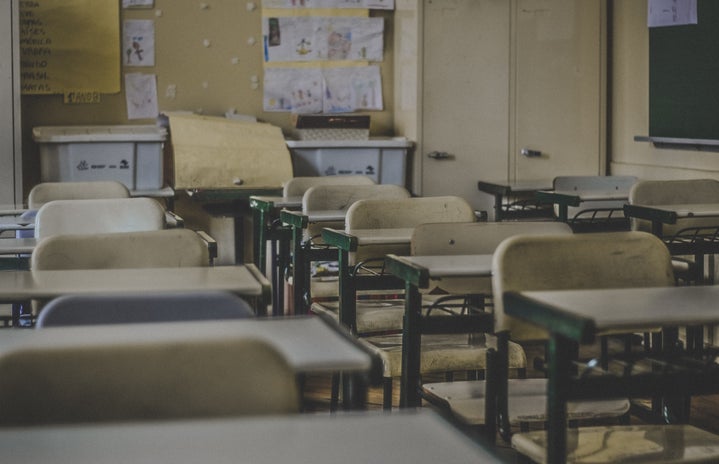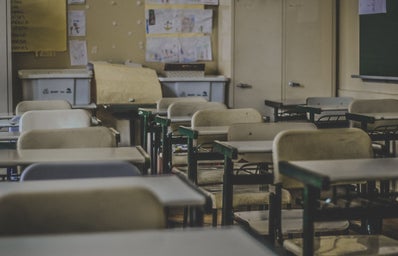TW: This story delves into the topic of gun violence and details a school shooting experience, which may be triggering to some readers.
The scent of a barbeque, sweaty arms brushing against one another in packed bleachers, and the school band playing slightly off to a popular song describe the happy moments I should remember from my first home football game of my senior year of high school. And I kind of do.
But these memories are overshadowed by what happened the rest of that night.
Before then, it was an enjoyable day. For the first time, I drove to school and later used my senior privilege to check out early (I normally had to stay late for cross country practice). I was named team captain after our timed trials. All that was left was the kickoff home football game, the perfect way to end the beginning of my senior year.
The score was 5-3 when it happened. Our team was winning — not that anyone really cared. It was not an official season game, but a practice one. But we were in the lead, and there were less than 10 minutes left. It was basically over. Everyone was figuring out where to satisfy their food cravings afterwards, who could drive and whose parents were OK with staying out late.
Then the first round fired.
I was sitting with my friend and her boyfriend. At the jarring sound, I turned to see what all the commotion was about. Everyone suddenly began to run. Without question, I joined them.
Trying to keep up with my friends, I realized that I’d forgotten my purse, which had my phone inside. I needed to call my parents to tell them to come and get me immediately. I took only two steps back to reach for my purse, but when I turned back around, my friends were gone.
There I was in the worst possible scenario all alone. (Unless you want to count all of the screaming strangers.)
So, I just followed the crowd. Some ran into the school while others ran as far away as possible. I decided to join the latter group, unsure of where the shooter was. All I could rationalize in that terrifying moment was that getting away would be my best bet. I beelined for the front gate, arriving to find everybody with the same idea practically on top of each other. The opening was too small, and people were fighting their way out one by one like a dam about to burst.
Shoving my way out of the crowd, someone suddenly knocked me to the ground, shattering my phone screen. With pure adrenaline coursing throughout my body, I pulled myself to my feet and called my mother, running with blood trickling down my leg.
Then the second round was fired.
In tune with the bang, my mother had just answered the phone, into which I screamed with fear.
“There’s a shooter!” I yelled to her. “There’s a shooter! Come now!”
My mother was hysterical. Unable to drive in such a state, she sent my dad, who speeded off to reach me.
One call down, I dialed the second one to my friend I’d been with at game, the same one who’d driven me there.
“Where are you?” I asked. The question was seemingly simple, but in that moment, it was a matter of life or death.
She told me that she and her boyfriend made it to her car and were able to leave before any hectic traffic. Because they were on their way home, they couldn’t come back to get me.
That was a lie.
In reality, my friends had run into the school thinking it would be safer. Through their panic, they managed to grab classmates that were practically strangers — but not me. I felt worthless to them, like five years of friendship meant nothing.
Hanging up, I realized that I was in a parking lot of pure chaos. Everyone was trying to escape the school grounds, some cars even crashing into each other through their haste. When I finally made it to the bus loop, which sat at the opposite end of the school from the football field, I even saw some people abandon their cars in the middle of the road and just make a run for it. Recently arrived policemen were doing their best to direct traffic, but no one was listening. Within the mania, I couldn’t blame them. We all just wanted to get out as fast as we could.
I soon found myself in a nearby neighborhood and my phone back to my ear as I spoke to dad. After driving over 100 miles per hour to get to me, he’d come along with my sister, but with the roads a nightmare, I had to search for his car. My dad told my sister to hop out so I could find them more easily, but I hysterically screamed at her to get back into the vehicle. We still had no idea where the gunman was. I wouldn’t have been able to live with myself if she’d gotten hurt trying to find me.
When I finally made it to my family, I collapsed into my dad’s arms, sobbing incoherently while trying to tell him what had happened. We made it home safe. My friends made it home safe. The football players, the cheerleaders and the band members all made it home safe. I learned in relief that no one from my high school was shot. The incident ended up being a gang-related, targeted shooting. The shooter hadn’t been there for us, but at the time, we didn’t know that.
The school district tried to convince us that it wasn’t a school shooting, but just a targeted event in which no students were harmed. But someone was still shot on school property while we were there. Somebody still died at my high school that night. The fact that it wasn’t intended for us didn’t make the fear any less real. It didn’t send away the thoughts wondering if that would be our last night alive. There was still real, lingering trauma.
After that evening, I was numb for a while. I went to church on that following Sunday and cried in the pew when the priest asked everyone to pray for our school. I remember the stomach-sinking fear I felt walking back into school on Monday morning. By the next week, no one really talked about it. It was already old news. So, I stopped talking about it, and I shoved all of those fears and anxieties deep inside of me. I was fine, I told myself. It could’ve been a lot worse, as so many people felt the need to tell me.
But not one day goes by that I still don’t think about that night.
It doesn’t help that I have a scar on my knee from when I fell in the parking lot, or that there’s still some damage on the top of my phone screen from when I dropped it.
But I’m fine, really. I’m over it.
At least, that’s what I thought.
I never told anyone in detail about that night until last year. For the first time in years, I opened up about the terror-filled event to a friend. Telling her my story was going well until I started crying, and then I couldn’t stop crying. Everything came flooding back, and I realized that I wasn’t over it. I never let myself heal the way that I should have.
My high school friends never apologized for leaving me and lying to me. I think that if I had at least someone to share that experience and talk about with, I would’ve been able to process my feelings much faster. But I didn’t.
So, how am I doing now?
To be honest, I really don’t know. I still think about that night, just not every day now. Maybe it’s a few times a week. I still feel nervous before big events. I always know the fastest way out of a crowd. I’m still working at trying to forgive my former friends. But now I can tell my story without breaking down. I don’t get the nightmares that I never told anyone about as much. I’m getting better.
So, yes. Really. I can now say that I’m fine, or at least working towards it.

